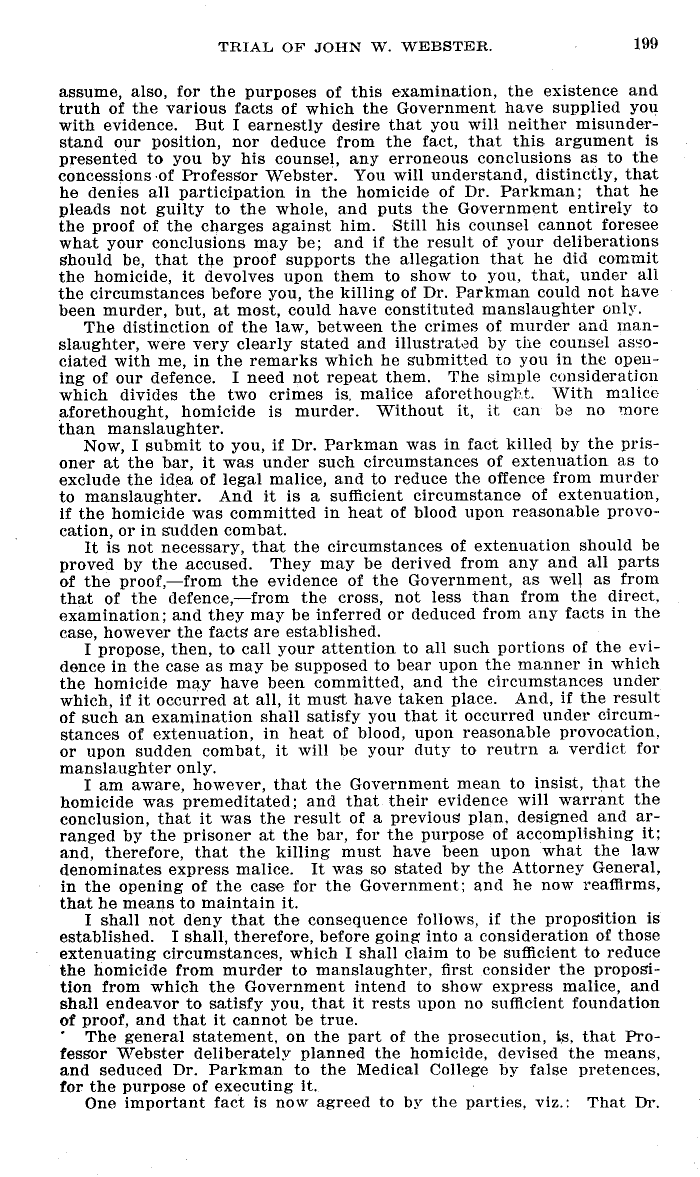|
TRIAL OF JOHN W. WEBSTER. 199
assume, also, for the purposes of this examination, the existence and
truth of the various facts of which the Government have supplied you
with evidence. But I earnestly desire that you will neither misunder-
stand our position, nor deduce from the fact, that this argument is
presented to you by his counsel, any erroneous conclusions as to the
concessions of Professor Webster. You will understand, distinctly, that
he denies all participation in the homicide of Dr. Parkman; that he
pleads not guilty to the whole, and puts the Government entirely to
the proof of the charges against him. Still his counsel cannot foresee
what your conclusions may be; and if the result of your deliberations
should be, that the proof supports the allegation that he did commit
the homicide, it devolves upon them to show to you, that, under all
the circumstances before you, the killing of Dr. Parkman could not have
been murder, but, at most, could have constituted manslaughter only.
The distinction of the law, between the crimes of murder and man-
slaughter, were very clearly stated and illustrated by the counsel asso-
ciated with me, in the remarks which he submitted to you in the open-
ing of our defence. I need not repeat them. The simple consideration
which divides the two crimes is, malice aforethougl-'.t. With malice
aforethought, homicide is murder. Without it, it can be no more
than manslaughter.
Now, I submit to you, if Dr. Parkman was in fact killed by the pris-
oner at the bar, it was under such circumstances of extenuation as to
exclude the idea of legal malice, and to reduce the offence from murder
to manslaughter. And it is a sufficient circumstance of extenuation,
if the homicide was committed in heat of blood upon reasonable provo-
cation, or in sudden combat.
It is not necessary, that the circumstances of extenuation should be
proved by the accused. They may be derived from any and all parts
of the proof,-from the evidence of the Government, as well as from
that of the defence,-from the cross, not less than from the direct,
examination; and they may be inferred or deduced from any facts in the
case, however the facts are established.
I propose, then, to call your attention to all such portions of the evi-
dence in the case as may be supposed to bear upon the manner in which
the homicide may have been committed, and the circumstances under
which, if it occurred at all, it must have taken place. And, if the result
of such an examination shall satisfy you that it occurred under circum-
stances of extenuation, in heat of blood, upon reasonable provocation,
or upon sudden combat, it will be your duty to reutrn a verdict for
manslaughter only.
I am aware, however, that the Government mean to insist, that the
homicide was premeditated; and that their evidence will warrant the
conclusion, that it was the result of a previous plan, designed and ar-
ranged by the prisoner at the bar, for the purpose of accomplishing it;
and, therefore, that the killing must have been upon what the law
denominates express malice. It was so stated by the Attorney General,
in the opening of the case for the Government: and he now reaffirms,
that he means to maintain it.
I shall not deny that the consequence follows, if the proposition is
established. I shall, therefore, before going into a consideration of those
extenuating circumstances, which I shall claim to be sufficient to reduce
the homicide from murder to manslaughter, first consider the proposi-
tion from which the Government intend to show express malice, and
shall endeavor to satisfy you, that it rests upon no sufficient foundation
of proof, and that it cannot be true.
The general statement, on the part of the prosecution, is, that Pro-
fessor VPebster deliberately planned the homicide, devised the means,
and seduced Dr. Parkman to the Medical College by false pretences,
for the purpose of executing it.
One important fact is now agreed to by the parties, viz.: That Dr.
|

